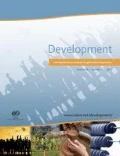Abstract

Franck Amalric graduated from the Ecole Polytechnique and the Ensaé (National School of Statistics and Economic Administration) in France, and holds a PhD in economics from Harvard University. Franck was Programme Director at the Society for International Development in Rome during six years. In this function, he developed and managed numerous projects touching various aspects of sustainable development (sustainable livelihoods, food security, conflicts over access to natural resources, North-South relations). He then joined UBS in Switzerland (18 months) as Senior Economist, where he set up a strategy for the development of socially responsible investment products. Subsequently he was head of Research of the Centre for Corporate Responsibility and Sustainability linked with the University of Zurich. Back in France since 2005, he now works as a health economist.
Similar content being viewed by others
Notes
I owe to Zygmunt Bauman (2008) this distinction between an objective and subjective we.
Among a plethora of possible examples consider for instance the World Commission on the Social Dimension of Globalization: ‘The growing interconnectivity among people across the world is nurturing the realization that we are all part of a global community. This nascent sense of interdependence, commitment to shared values, and solidarity among peoples across the world can be channelled to build enlightened and democratic global governance in the interests of all’ (World Commission on the Social Dimension of Globalization, 2004: x).
Note that while the awareness raising approach was eminently political – it is the individual qua citizen who is to change in order to support policy changes which, in turn, will constrain all economic agents (thus playing on the classic distinction between the individual qua economic agent and the individual qua citizen, or between homo oeconomicus and homo politicus) – it is now the economic agent who is to change, leading eventually, perhaps, to a change of the individual qua citizen as well.
This third, and central, approach to nurturing a culture of self-restraint has been comparatively overlooked. Speth (2008), for instance, does not mention it at all despite his noteworthy efforts in trying to analyse how such a culture could come about.
The expression ‘Great Transition’ was coined by Paul Raskin and his colleagues (Raskin et al., 2002) to refer to the process to societal transformation sustainability requires: ‘A Great Transition [towards sustainability] envisions a profound change in the character of civilization in response to planetary challenges. (…) All components of culture change in the context of a holistic shift in the structure of society and its relation to nature. The transition of the whole social system entrains a set of sub-transitions that transform values and knowledge, demography and social relations, economic and governance institutions, and technology and the environment. These dimensions reinforce and amplify one another in an accelerating process of transformation’ (2002: 56).
References
Arendt, Hannah (1958) The Human Condition, Chicago: The University of Chicago Press.
Bauman, Zygmunt (2008) Does Ethics Have a Chance in a World of Consumers, Cambridge, MA: Harvard University Press.
Gardiner Stephen, M. (2004) ‘Ethics and Global Climate Change’, Ethics 114 (3): 555–600.
Gorz, André (1993) ‘Political Ecology: Expertocracy versus self-limitation’, New Left Review 202: 55–68.
Kumar, Satish (2002) Your are Therefore I am. A declaration of dependence, Foxhole: Green Books.
Raskin, Paul, Tariq Banuri, Gilberto Gallopín, Pablo Gutman, Al Hammond, Robert W. Kates and Rob Swart (2002) The Great Transition: The promise and lure of the times ahead, Boston, MA: Tellus Institute.
Speth James, Gustave (2008) The Bridge at the Edge of the World, New Haven: Yale University Press.
Ward, Barbara (1980) ‘Where There is No Vision, the People Perish’, International Development Review 1980 (4): 4–8. Reprinted in Development 40(1): 84–87.
World Commission on the Social Dimension of Globalization (2004) A Fair Globalization: Creating opportunities for all, Geneva: International Labour Office.
Additional information
Evaluates how citizenship, accountability and responsibility are crucial in the transformation towards sustainability
Rights and permissions
About this article
Cite this article
Amalric, F. Nurturing a Culture of Self-restraint. Development 54, 150–154 (2011). https://doi.org/10.1057/dev.2011.32
Published:
Issue Date:
DOI: https://doi.org/10.1057/dev.2011.32




